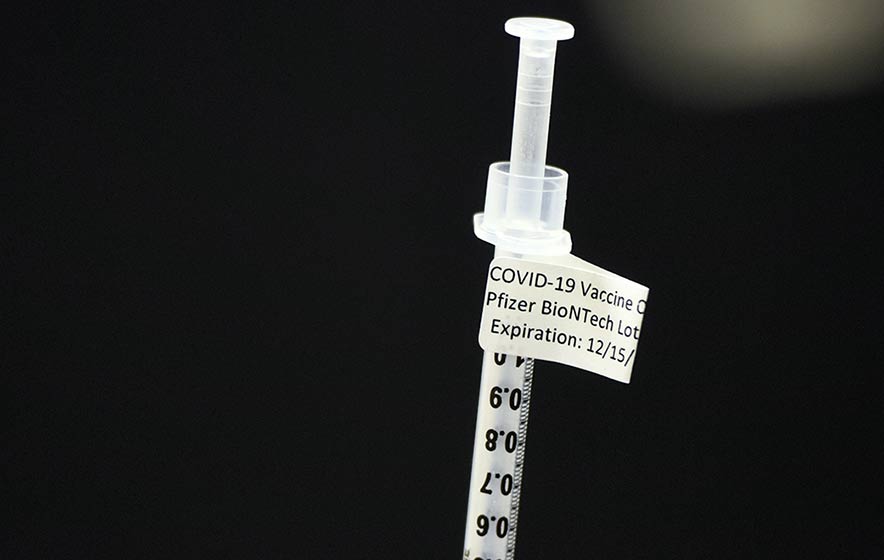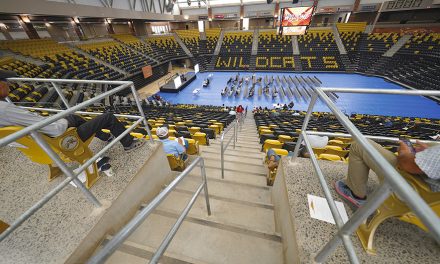
COVID deaths reach 1,000 on Navajo Nation

Navajo Times | Donovan Quintero
A dose of the Pfizer/BioNtech COVID-19 vaccine awaits a health care worker's arm.
WINDOW ROCK
In less than a year the Navajo Nation has lost 1,000 Diné to COVID-19.
A reported 59 more people tested positive for COVID-19 in the Navajo Nation as of Thursday. Reports indicate that 14,275 individuals have recovered from COVID-19, and 231,031 COVID-19 tests have been administered. The total number of positive COVID-19 cases is now 27,987.
“Unfortunately, we reached 1,000 deaths today. We offer our thoughts and prayers to all of the families who have lost loved ones,” stated Navajo President Jonathan Nez. “We can all do our part to honor their memory and to prevent more deaths by keeping our guard up and taking all precautions to reduce the number of cases.”
When the first COVID-19 cases were reported in March the Navajo Nation worked quickly to isolate the community of Chilchinbito, where the virus was reported to have first struck. But, soon enough the numbers continued to rise and the Navajo Nation had its first wave in the spring.
Before the virus hit the Navajo Nation, efforts such as closing schools, government offices, businesses, and declaring a state of public health emergency were made. Once the virus hit, strict measures such as weekend lockdowns, curfews, and mandatory mask wearing began and have been ongoing since.
While the country continued to grapple with COVID-19 testing, the Navajo Nation and Indian Health Service worked tirelessly to test Diné citizens. As the Nation’s second wave has platueaued the main concern is vaccination, which again the Navajo Nation has taken upon itself in trying to get as many Diné vaccinated as possible.
“We rely on the science,” said Nez. “We were probably the first to mandate masks in April and we never changed it. I surrounded myself with helath professionals and they told me this is what we need to do, and as leader of a Nation I relied on them for counsel.”
As a public service, the Navajo Times is making all coverage of the coronavirus pandemic fully available on its website. Please support the Times by subscribing.
How to protect yourself and others.
Why masks work. Which masks are best.
Resources for coronavirus assistance
As of Jan. 27, there have been 64,083 vaccine doses distributed and 40,240 have been administered — 63 percent. This type of administration helps the Nation in advocating for more vaccine.
A Navajo Department of Health situation report showed among children under 10 there were 1,890 positive cases; 10-19 had 3,599 cases; 20-29 had 4,229 positive cases; 30-39 had 4,383 positive cases; 40-49 had 3,931 cases; 50-59 had 4,135 cases; 60-29 had 3,310 cases; 70-79 had 1,556 cases and 80 plus had 842 cases.
Fewer than 20 people under 30 under 30 have died of the disease; 30-39 had 67 deaths; 40-49 had 92 deaths; 50-59 had 162 deaths; 60-69 had 233 deaths; 70-79 had 221 deaths; 80 plus had 194 deaths.
“I heard a report that 47 percent of the people who caught the virus were in the age from 20-39,” said Nez. “But the deaths, two-thirds were 65 and over. When I’m out there talking to the elders they’re saying ‘We are listening and staying home.’ But overall I believe the Navajo public has adhered to the public health directives.”
In order to get more people vaccinated the Navajo Nation has lifted its weekend lockdown to allow for people to get their vaccines, and this will also benefit health professionals who have been working tirelessly on COVID-19, as well as everyday medical needs.
“With more vaccine events being scheduled on weekends, we encourage our Navajo people to receive the vaccine when it is available,” stated Nez. “With over 40,000 doses of the vaccines administered so far, we have not received any reports of adverse effects here on the Navajo Nation. We also ask our people to remain patient as we continue to advocate for more vaccines. Our health care workers are doing the very best that they can with the limited number of vaccines that we have received.”
Dr. Loretta Christensen, chief medical officer at Navajo Area IHS, said Navajo is fortunate to get a supply of vaccine every week and is expecting 6,400 doses next week.
“If you have been covid-positive and you get your vaccination, you may have more side effects than other people,” said Christensen. “Thus far the side effects have been a sore arm, mild redness, some tiredness. The second dose you may get more side effects if you never had covid: sore arm, fatigue, little redness, and headache. But it’s self-limited, a majority of these effects only last one to two days. Its common with vaccination because they’re creating an immune response.”
When it comes to the new covid variants Puthiery Va, Chinle Comprehensive Health Care Facility, said the Center for Disease Control is tracking the British variant. This variant transmits more easily and faster, and it’s been identified in 20 states including Utah, Colorado and New Mexico. Another strain identified in Minnesota is the Brazilian strain.
“That means the vaccine program is still going to be a huge part of this response,” said Va. “We still want to vaccinate as many people as quickly as possible, given our supply. Containment of this outbreak is critical. If you have less cases, then there’s less opportunity for this virus to mutate. That’s what we are aiming for.”
Va explained that even if you get the vaccines it still doesn’t mean you won’t get COVID-19. It reduces the chances of contracting the virus and if you do get COVID-19 the symptoms aren’t as severe.
“If you get COVID after vaccination we don’t know if you can still transmit it to others,” said Va. “That is still being studied. That’s why we emphasize masks. There are still a lot of unknowns with these strains and what they mean in regards to vaccine effectiveness and transmission.”
Continue to wear masks, social distance, wash hands, and avoid social gathering. Quality of masks is key, with medical-grade masks more effective than homemade cloth ones. Wearing two layers of masks is recommended.







 Highway 264,
Highway 264, I-40, WB @ Winslow
I-40, WB @ Winslow